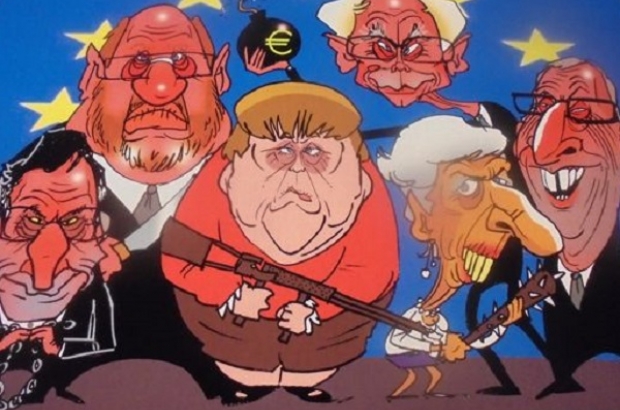- Daily & Weekly newsletters
- Buy & download The Bulletin
- Comment on our articles
'Political cartoons are like fresh fish': Europe as seen by press cartoonists
The refugee crisis, Brexit and europhobia are among the topical issues addressed by 52 cartoonists from 29 countries at a new temporary exhibition of press cartoons at the Mons Memorial Museum that questions how far Europe has travelled away from times of war.
This Is Not Europe - 120 Press Cartoons also tackles the economic crisis, German Europe, nationalism, Turkey, Ukraine & Russia and Europe as seen by others. Its curator, Nicolas Vadot, a British-French-Australian political cartoonist working in Brussels, says: "The main point of the exhibition is to show, especially young people, that Europe is a wonderful utopia that was put together without fighting and it's about peace, that's the most important thing.
"Young people tend to take peace for granted whereas peace could disappear any day. So the show is about being united and it's about showing what's not working and what's been achieved and what can be achieved.
"Some of these topics are serious and hard such as the refugee crisis. The crisis arrives at a time when Europe doesn't know who it is anymore - we have to look in the mirror and ask ourselves what do we want to do together, how was Europe built and how is it going to build itself; is it a finished device or can it welcome migrants? I think that we can welcome migrants if we stick with our values as well. These are very polemical issues which must be addressed and are being addressed today."
Spoilt for choice
Choosing the works on display was a hard task. "None of the cartoons were done specially for the show - these were all published between 2010 and 2015," Vadot says. "I asked Cartooning for Peace to send the topics to cartoonists near and far and I received over 700 cartoons. I chose different styles, different approaches, different ways of seeing things to show the diversity. It was difficult. There are wonderful cartoons that didn't make it into the exhibition but all the cartoons that did make it were relevant to me.
"In the second room I will be adding cartoons during the run of the exhibition because it is important to show that political cartoons are being made every day, that they are the history of today. They are like fresh fish; you know that the cartoon served today was fished yesterday and it's still fresh, but tomorrow it might not be still be fresh anymore.
"I want people to have fun going to this exhibition. I don't want them to see it as a boring thing. Often Europe is seen as boring stuff. I want people to question themselves and be challenged by the cartoons, they may agree or disagree; I don't care as long as they are challenged."
Plantu, a political cartoonist for Le Monde for the past 43 years, is the president of Cartooning for Peace. "It is an association we built 10 years ago with Kofi Annan when he was secretary-general of the UN as a reaction to the fatwa against the Danish cartoonist who drew Mohammed," Plantu says.
"We thought that it was important to mix all the cartoonists in the world: Christian, Jewish, Muslim, agnostic. What is the responsibility of cartooning in the digital age? When someone is drawing a cartoon on paper he has to keep in mind that it will not remain just on paper.
"Things have fundamentally changed with the internet. To go back to the Danish cartoonist, without the internet, without Photoshop, there would have been no problem, no possibility to manipulate the image. Don't forget 40 people were shot during a demonstration in Pakistan at the time. The internet is a wonderful tool but must remain a tool and not become a master."
This Is Not Europe - 120 Press Cartoons, until 26 June
Mons Memorial Museum, Boulevard Dolez 51, 7000 Mons














